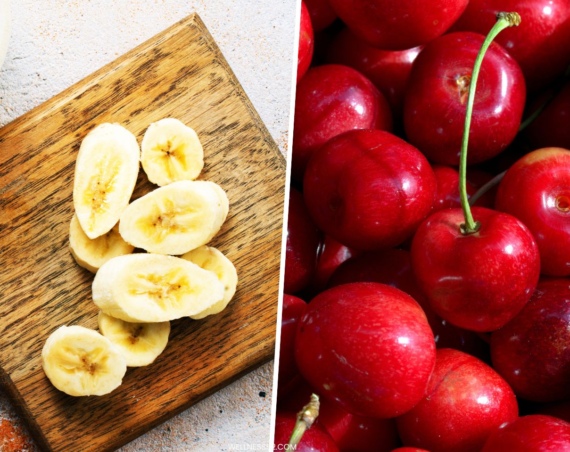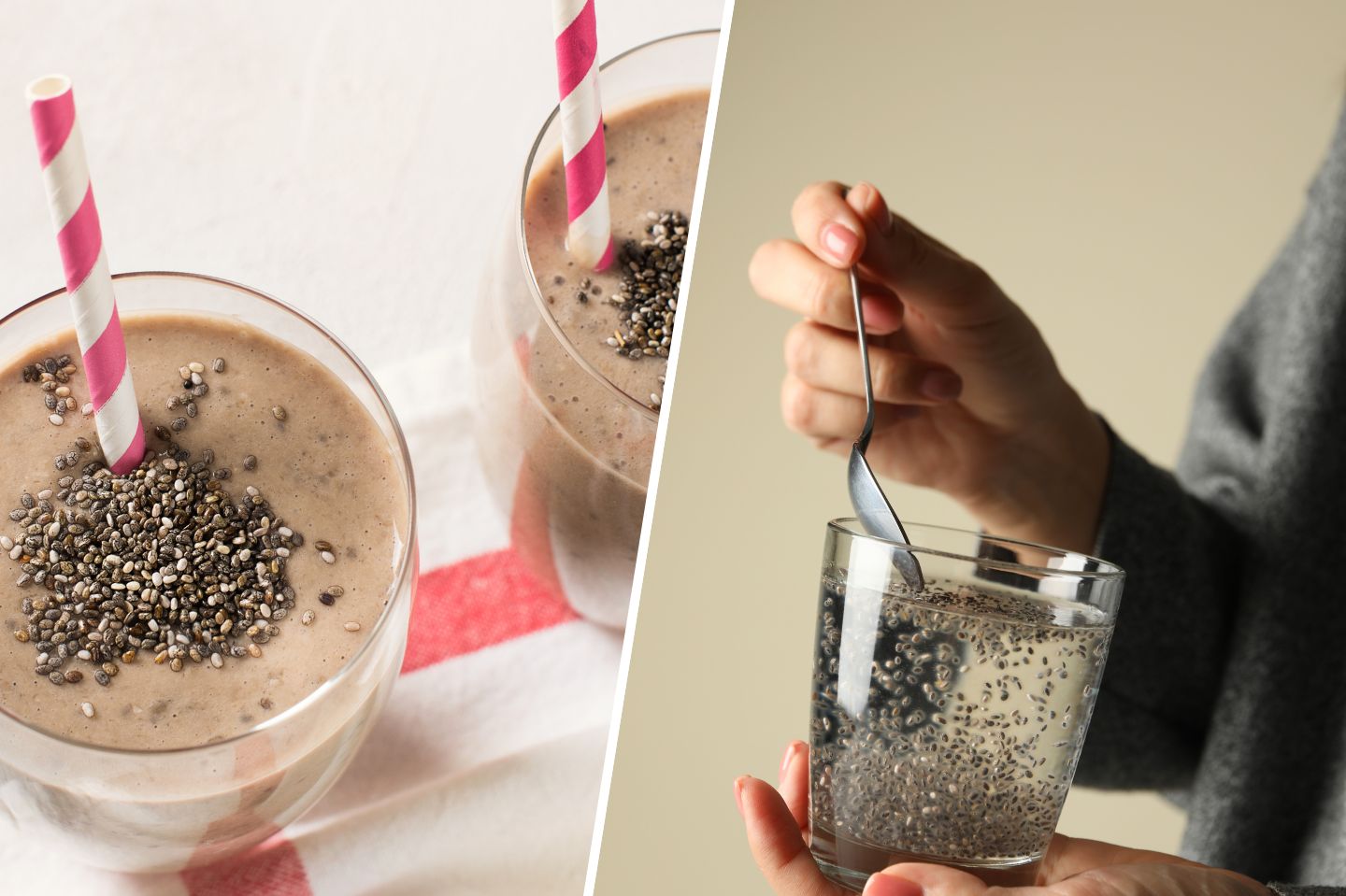
Chia seeds: tiny but mighty nutritional powerhouses. Packed with fiber, protein, omega-3 fatty acids, and antioxidants, these ancient seeds offer a multitude of potential health benefits.
From supporting heart health and digestive well-being to aiding in blood sugar control and weight management, chia seeds have garnered significant attention in the health and wellness world.
While chia seeds are generally considered safe for most people, it’s essential to note that consuming excessive amounts of fiber can lead to digestive discomfort. Additionally, individuals with certain medical conditions should consult with a healthcare professional before incorporating chia seeds into their diet.
Let’s delve into the specific ways these tiny seeds can positively impact your health.
What Are Chia Seeds?

Chia seeds are tiny black seeds from the Salvia Hispanica plant. They have reportedly been around since the Aztecs and Mayans and are used for their medicinal properties.
Decades ago it was popular to use them to grow our chia pets. Now they are a popular health food item and for good reason.
Chia Seeds Nutrition Facts
Chia seeds are a plant-based source of omega-3 fatty acids. They provide alpha-linolenic acid (ALA), which can’t be used by the body.
ALA must be converted to EPA (eicosapentaenoic acid) and DHA (docosahexaenoic acid) before the body can use it. EPA and DHA are the omega-3s found in fish.
Additionally, about 94% of the carbohydrate found in them is fiber. Fiber is a non-digestible form of carbohydrate that provides health benefits.
It is recommended that women and men aim to consume 25 and 38 grams of fiber per day, respectively. Current estimates are that Americans get about only 15 grams daily.
Chia seeds are also a source of protein and several micronutrients and antioxidants.
Per 1 tablespoon, they provide:
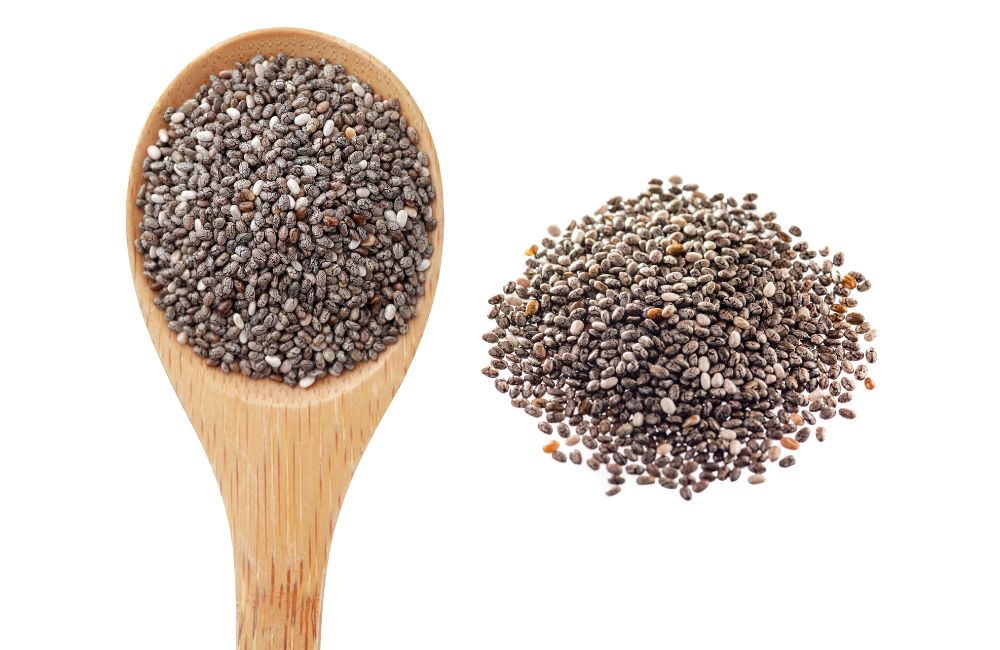
- 56 calories
- 2 grams of protein
- 4.4 grams of total fat
- 2.4 grams ALA
- 3 grams of total carbohydrate
- 2.9 grams of fiber
- 26.3 mg calcium
- 41 mg magnesium
- 67.5 mg phosphorus
- 85 mg potassium (1)
Benefits of Chia Seeds
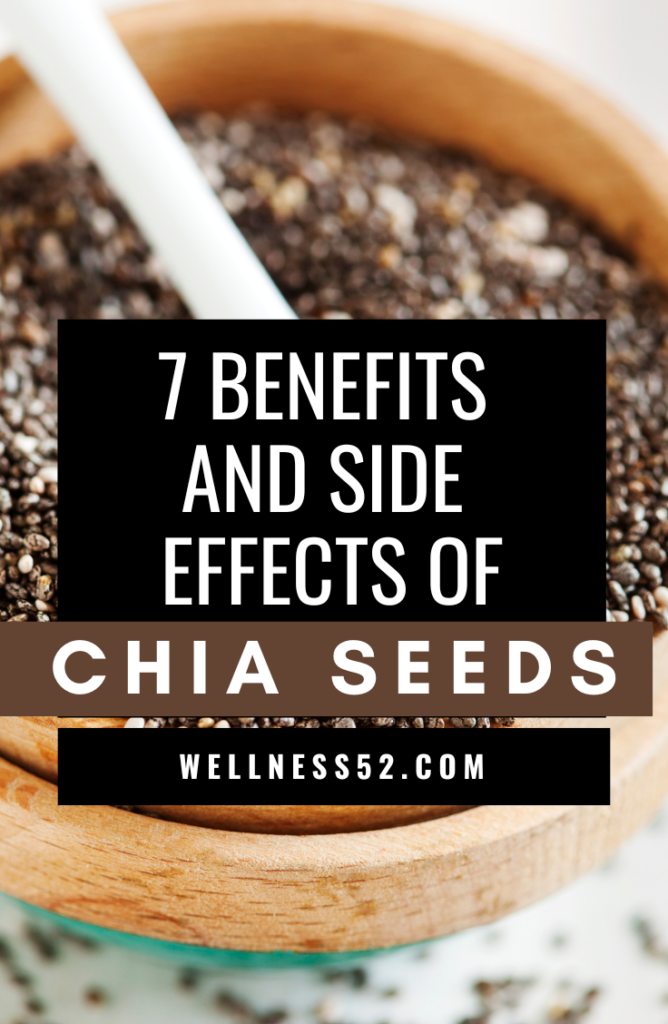
There are several potential benefits of eating chia seeds.
Boost Your Fiber Intake
Fiber offers several health benefits including improved bowel health, controlling blood sugar levels, lowering cholesterol, and helping with weight loss. The average American does not get enough of it in their diet.
Chia seeds provide more fiber than flax seeds. In fact, they provide more than twice the amount you can get from most other seeds or nuts (2).
Simply adding 2 tablespoons of chia seeds to your diet could add over 5 grams to your intake.
This can simply be sprinkling the seeds over your cereal or oatmeal, adding them to a smoothie, adding them to baked goods, or making chia pudding.
Provides Antioxidants
Antioxidants are compounds that protect from oxidative stress.
Chia seeds offer 68 micrograms of lutein and zeaxanthin per tablespoon (1). These are antioxidants that are important to eye health.
The seeds also provide polyphenols, such as caffeic acid, chlorogenic acid, and quercetin. They are also a source of isoflavones (2).
Improve Digestion
Because of their fiber content, chia seeds may be able to improve your digestion and overall gut health.
Improves Satiety
Chia seeds may improve satiety. This is not surprising given their high fiber content.
One study in healthy people found that chia seed consumption induced short-term satiety (3).
A small study found that appetite ratings were lower with chia seed intake (4).
Another small follow-up study, found that chia seeds compared to flax seeds significantly reduced the desire to eat and participants’ overall appetite score (5).
Aid With Weight Loss
Due to their high fiber content, they may be a helpful aid with weight loss.
In fact, one study has shown significantly more weight loss in those who consumed chia seeds versus placebo (6).
This was accompanied by a greater reduction in the waist circumference ratio.
It is worth noting that the recorded weight loss in the chia seed group was only about 4 pounds over the course of 6 months. Yet, if weight loss is needed, a safe amount of weight loss is 1-2 pounds per week (which would equate to 26-52 pounds in a 6-month period).
Two other studies have not been able to find body composition changes as a result of chia seeds (7, 8).
A study evaluating several foods found that dietary modifications including chia seed resulted in weight loss and a reduction in waist circumference but the weight loss was not different from the placebo group (9).
So far, research has not shown that chia seeds will magically help with weight loss by themselves. Yet, including them in a healthy diet that is portioned to achieve weight loss may help.
Lower Blood Sugar
Including chia seeds in your diet may help with blood sugar control, an important benefit for people with type 2 diabetes.
One study in 11 healthy subjects, found a dose-response relationship between chia seeds and post-prandial glucose levels (blood sugar after a meal). In other words, the more seeds consumed the better the reduction in post-meal blood sugar (4).
Another very small study of 13 healthy volunteers found that chia seeds helped attenuate blood sugar levels but the clinical significance of this in healthy people is questionable (10).
It should also be noted that at least one of the study investigators received funding from companies that produce and market chia seeds (10).
While it may be possible that eating chia seeds can help lower post-meal blood sugar response, further research is still needed.
Reduce Heart Disease Risk Factors
There are several risk factors for heart disease and chia seeds have been proposed to help reduce some of these risk factors. This includes improving hypertension, improving lipid profiles or lowering cholesterol levels, and reducing markers of inflammation.
One study found that 35 grams daily of chia seed flour significantly reduced blood pressure, whether or not they were treated with medication (11).
An additional study on people with diabetes found that 37 grams of chia seeds daily for 12 weeks found a similar reduction (12).
However, two additional larger studies were unable to find a significant change in hypertension from including chia seeds in the diet (7, 8).
Most of the studies have not found any improvements in lipid profiles as a result of chia seeds (7, 8).
One study did find a significant reduction in triglyceride concentration (9) but the chia seeds were given in combination with nopal, oats, and soybeans in this study so it is difficult to know if chia seeds had the desired effect.
C-reactive protein (CRP) is a blood test that is a marker of inflammation if elevated. One study of 12 subjects found that 37 grams of chia seeds daily along with a healthy diet were able to reduce CRP levels (12).
Chia seeds have the potential to reduce heart disease risk factors but it is important that it is done in combination with a proper diet to promote heart health.
Side Effects
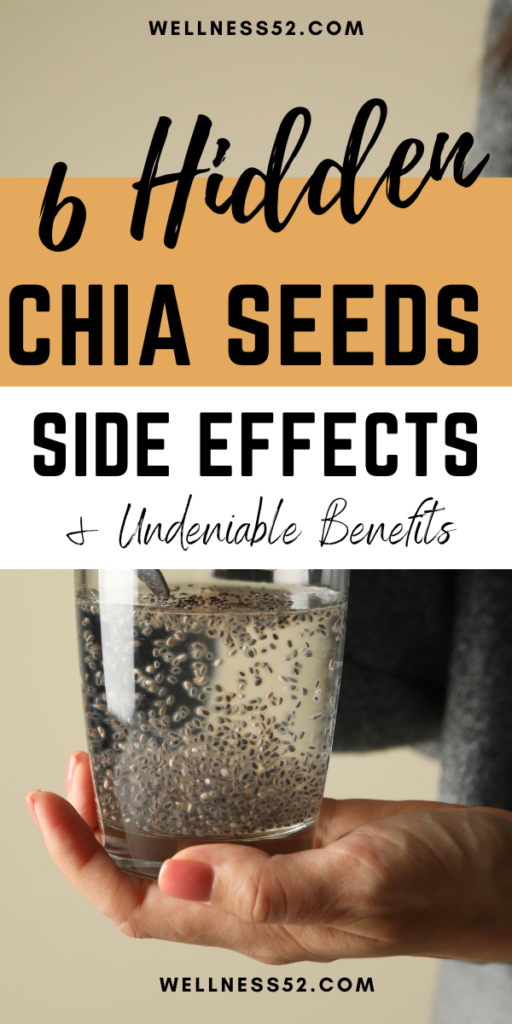
If consuming the seeds in moderation, the side effects will be minimal. Yet, there is always a small chance that side effects can occur. A few possible side effects include:
Digestive Problems
Since chia seeds provide a lot of fiber, it is possible you could experience side effects of too much fiber in the diet (although you would need to be eating a lot of them). This could lead to abdominal bloating and gas, constipation, or abdominal pain.
To avoid any digestive problems, don’t eat excessive amounts of seeds, and be sure to drink enough water.
Chia Seed Allergy
If you are allergic to chia seeds, don’t eat them. Although rare, cases of chia seed allergy have been reported and the symptoms included shortness of breath, swelling, and hives (13).
Choking Hazard
This seems counter-intuitive because the seeds are so small. However, they expand and become gelatinous in liquids.
There was a case in which a young man swallowed a tablespoon of the seeds and drank water. It is unclear why, but the chia seeds stayed in the esophagus where they absorbed the liquid causing a blockage that required medical attention (14).
Exacerbate Flare-UPS Associated With Bowel Disease
Generally, seeds and nuts are not recommended for people experiencing a flare-up associated with bowel disease. This would include anyone with Crohn’s, colitis, or diverticulitis.
Interact With Medications
The seeds themselves don’t necessarily interact with medication. However, if you are on medication to control your blood pressure or blood sugar and you start adding more seeds to your diet, you will want to be cautious. Suddenly adding a lot more chia seeds could send your levels too low.
Be sure to discuss with your physician before making significant diet modifications or if you are having symptoms of low blood pressure or glucose.
May Increase Risk of Prostate Cancer
Some evidence suggests that high intakes of ALA are associated with an increased risk of prostate cancer (15). Chia is a great source of ALA so it may be prudent to avoid excess intake if you are already at risk of prostate cancer.
How Do You Eat Chia Seeds?
There are several ways to incorporate chia seeds into your diet. They are flavorless and will take on any flavor that you add to them. It’s also important to note that they can absorb 10-12 times their weight in liquids.
10 Simple Ways to Use the Seeds
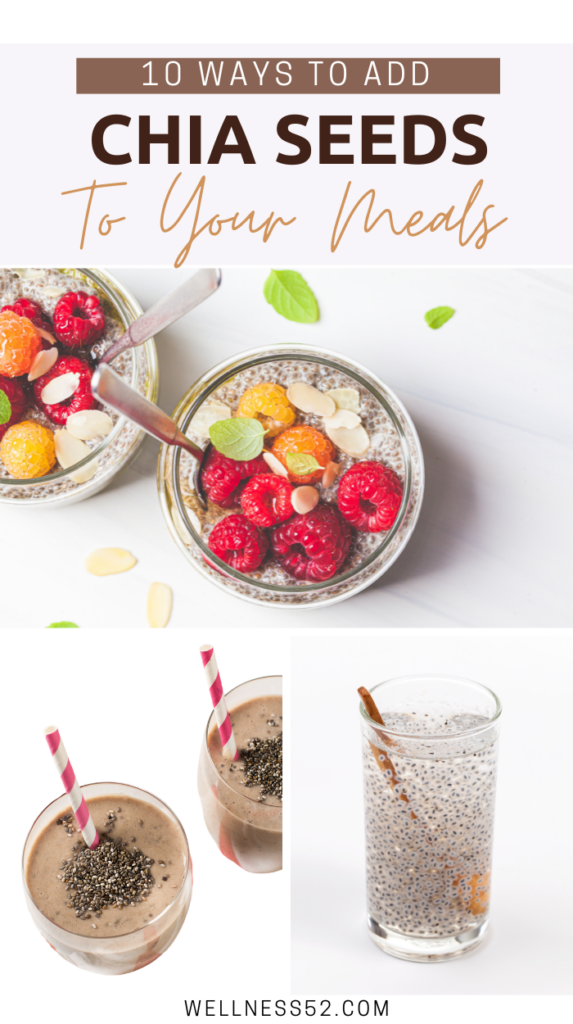
- Add to water: Some people make chia water by mixing 1/4 c chia seeds with 4 cups of water. Since the seeds offer no flavor you may want to add flavor to this by adding a small amount of fruit juice.
- Make a chia pudding: This is the most popular way to incorporate them. There are many recipe ideas available for puddings and it makes a great breakfast or snack. Since the seeds are flavorless, you can add your desired flavors – cocoa, coconut, or simply sweetened with honey or maple syrup. Then top it with fresh fruit and nuts.
- Add to oatmeal: They can be added to oatmeal, steel-cut oats, or overnight oats for an added nutritional boost.
- Use as an egg substitute: Since the seeds become gelatinous in a liquid, they can be used in place of eggs in baked goods. This is a popular substitute for vegans when baking and a recipe calls for eggs. A common method for one egg is to let 1 tablespoon of chia seeds sit in 3 tablespoons of water until it becomes a pudding consistency
- Add to smoothies: Chia seeds can be blended into smoothies or added as a topping in smoothie bowls. This is a great way to add more protein and omega-3s to a food that is often mostly carbs.
- Bake in muffins or bread: Chia seeds can be added to muffin recipes in the same way you would use flax seeds. You can also the seeds to your baked bread recipes.
- Make a jam: Chia jams are becoming increasingly popular. There are several recipes to make jams with fresh or frozen fruit and added chia seeds.
- Thicken soups: Adding chia seeds to a soup can help to thicken it.
- Add to a breakfast cereal: Chia seeds can be sprinkled over any breakfast cereal but they can also serve as the cereal itself.
- Add to a salad or any spread: Sprinkle chia seeds over salads or a spread or dip. They could also be blended into spreads, such as hummus.
Where to Buy Chia Seeds
Chia seeds are widely available and can be found at a grocery store or health food store.
Whole foods and Amazon have them available. Walmart is also a great place to find organic versions at an affordable price. I have also found them at Trader Joe’s.
You can find chia seeds from reputable brands like Bob’s Red Mill, Kiva, Sunfood, and Nutiva.
Last Word
Chia seeds are a nutrient-dense food. They provide protein, fiber, and omega-3 fatty acids – all of which are nutrients important to our health and preventing heart disease. In addition, the benefits of chia seeds include multiple micronutrients and antioxidants.
Research to date has not proven that chia seeds, by themselves, are a magic bullet. A recent systematic review concluded that current evidence does not support any health claims for chia seed in any indication (16).
Yet, nutrition experts agree that they are a healthy food choice and rich in essential nutrients.
They may have the potential to offer several health benefits but you will get more benefits from them when they are consumed as part of a healthy diet to maintain a healthy weight.


